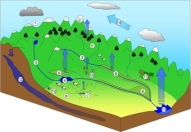Prof. Jason P. Evans
Climate Change Research Centre
University of New South Wales









Bayesian uncertainty analysis of the input meteorological variables in estimation of the sensible heat flux.
Ershadi, A., M.F. McCabe, Evans, J.P. and G. Mariethoz
AGU Fall meeting, 3-7 December 2012, San Francisco, USA. Abstract
A Bayesian uncertainty analysis framework is developed for the Surface Energy Balance System (SEBS) model to study the uncertainty of land surface temperature, air temperature, and wind speed for estimation of the sensible heat flux. Data from 12 eddy-covariance towers over soybean and corn are used from the Soil Moisture Experiment 2002 (SMEX02). Results show that the uncertainties in the local observations of the land surface temperature have the strongest effects on the mismatch of the observed and estimated sensible heat flux, with Bayesian inferred values being up to ±5 °C different from observed values. However, Bayesian inferred air temperature and wind speed are close to those observed at the towers, implying that local observations of these variables are spatially representative.
On the other hand, the footprint of the land surface temperature as sensed by the in-situ tower based measurements does not seem to be representative of the larger scale variability, suggesting that local measurements of the land surface temperature cannot be used as representative values for calculation of the sensible heat flux without spatial scaling.
|
|